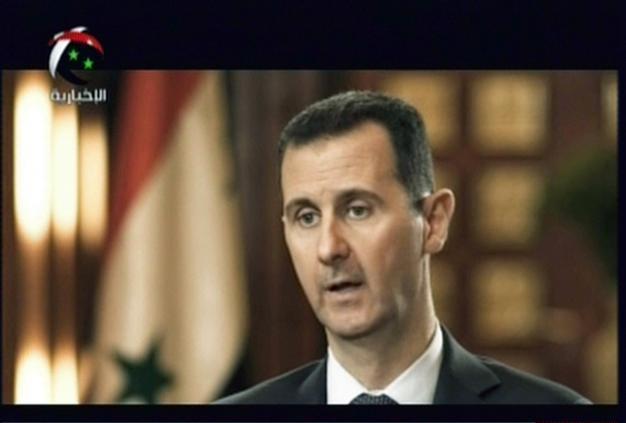Syria's Assad warns West over Qaeda, says defeat of his regime 'not an option'
DAMASCUS - Agence France-Presse

An image grab taken from the Syrian Al-Ikhbariya television station on April 17, 2013, shows Syrian President Bashar al-Assad speaking during an interview. AFP PHOTO/AL-IKHBARIYA
President Bashar al-Assad warned on April 17 the West that it will pay a heavy price for its alleged support of Al-Qaeda in Syria and said his regime's defeat is not an option.
Assad, whose regime has been battling an uprising since March 2011, reiterated in an interview with official television Al-Ikhbariya his long-held claim that the roots of Syria's conflict lie in a foreign-backed conspiracy.
He also warned the conflict could spill over into Jordan, and that there would be no dialogue with the exiled opposition.
"The West has paid heavily for funding Al-Qaeda in its early stages in Afghanistan. Today it is doing the same in Syria, Libya and other places, and will pay a heavy price in the heart of Europe and the United States," Assad said.
Last week, the jihadist rebel group Al-Nusra Front pledged allegiance to Al-Qaeda chief Ayman al-Zawahiri, who had previously urged rebels to establish an Islamic state in Syria.
The UN says more than 70,000 people have been killed in Syria over the past two years in a conflict that broke out after the regime unleashed a brutal crackdown on a popular uprising that later morphed into an insurgency.
Speaking on the anniversary of Syria's independence day from France, Assad said that "from the first day, what is happening in Syria is dictated from abroad." "We are facing a new war, a new method" with fighters, "some of whom are Arabs, not Syrians," the president said in the hour-long interview, adding that the "army is not fighting a war to liberate Syrian territory, but a war on terror." "There is a bid to invade Syria with forces coming from the outside, of different nationalities, though they follow new, different tactics from those followed by those who came to colonise in the region, and from those used by the United States to occupy Iraq and Afghanistan." "There is an attempt at cultural colonisation, meaning ideological invasion, in Syria, leading in one of two directions.
"Either Syria becomes subservient and submissive to the big powers and the West, or it becomes subservient to obscurantist, extremist forces. We need to hold on ever more strongly to the meaning of independence." Assad did not spell out how he believed the West was supporting Al-Qaeda in Syria. The United States and EU countries have been loathe to fulfill rebel requests for arms for fear they might fall into the hands of extremists.
But he insisted that "everyone who carries weapons and attacks civilians is a terrorist, be they Al-Qaeda or not.... There are no moderate terrorists." Assad also accused the West of "double, or what I would call triple or quadruple standards".
"The West fights (Al-Qaeda) in Mali and supports it in Syria and Libya," he said.
Assad warned that a defeat of his government would spell the demise of Syria. Vowing he will not surrender, he said the Syrian people would decide whether he should stay or go, implying he might run for elections scheduled for 2014.
"There is no option but victory. Otherwise it will be the end of Syria, and I don't think that the Syrian people will accept such an option," he said.
"The truth is there is a war and I repeat: no to surrender, no to submission." "The position (of president) has no value without popular backing. The people's decision is what matters in the question of whether the president stays or goes," said Assad.
Meanwhile, he said, officials were laying the groundwork for a "national dialogue" but ruled out talks with exiled members of the opposition, whom he accused of treason.
"We do not enter into negotiations with people who do not have a popular base," Assad said.
"How can you be patriotic if you've fled" Syria, he added, in reference to exiled leaders of the main opposition National Coalition.
And rejecting the possibility of humanitarian intervention in Syria's conflict, Assad said such a policy "would only aim to destroy the Syrians".
Assad took to task neighbouring Jordan, which says it is hosting around 500,000 Syria refugees, accusing it of allowing rebels and arms free movement across its borders.
"I cannot believe that hundreds (of rebels) are entering Syria with their weapons while Jordan is capable of arresting any single person with a light arm for going to resist in Palestine," Assad said.
"We would wish that our Jordanian neighbours realise that... the fire will not stop at our borders." In Amman, Information Minister Mohammad Momani said the United States plans to deploy 200 troops in Jordan because of the war in neighbouring Syria "in light of the deteriorating situation in Syria." This would be 50 more than those already there.
US Defense Secretary Chuck Hagel meanwhile declined Wednesday to discuss Syria's possible use of chemical weapons against rebels, raising doubts over whether Washington still views such action as a "red line." President Barack Obama has repeatedly warned Damascus against resorting to chemical weapons, hinting that the use of such arms or the prospect of militant groups gaining control of them could prompt a US military intervention.
Violence across Syria killed at least 124 people on Wednesday, including six children, the Britain-based Syrian Observatory for Human Rights reported.
